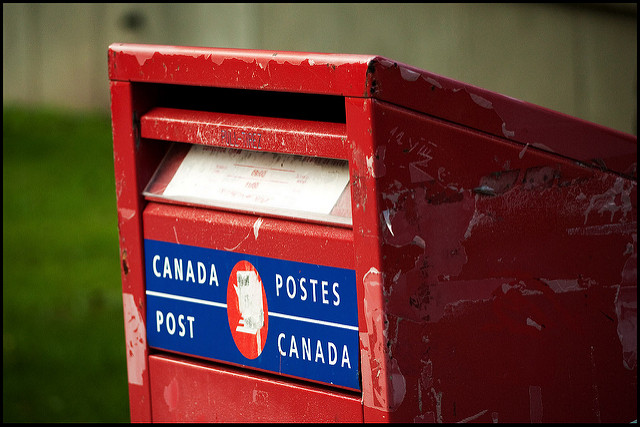Like this article? rabble is reader-supported journalism. Chip in to keep stories like these coming.
Posties could be off the job by Friday, following a 72-hour lockout notice issued by Canada Post this morning.
The Canadian Union of Postal Workers (CUPW), which represents 50,000 employees, has been in contract negotiations with the Crown corporation since November.
Canada Post has proposed switching new employees to a defined contribution pension plan, resulting in less security in retirement for those workers. This has been a principle point of contention between the union and management.
Currently, employees covered under the current benefit plan are guaranteed a pre-determined set of benefits in retirement. The proposed change would alter the plan such that the contributions made by each worker would be set, but there would be no guarantee of the benefits they would receive in retirement.
The minimal wage increase offered by Canada Post has also been labelled as an “insult” by CUPW, which also struggled to make much headway on gender pay disparity among its rural and suburban members at negotiations.
Both Jon Hamilton, spokesman for Canada Post, and CUPW president Mike Palecek were interviewed on CBC this morning, hours after the lockout notice was issued.
Hamilton was adamant the union’s stance on the pension plan continued to be irresponsible, and highlighted the damage to Canada Post’s business caused by the negotiations. Palecek rejected his claims, citing the $2.7 billion surplus in the pension plan last year, as well as Canada Post’s actions contributing to the decline in its business.
“The mail coming is really starting to dry up,” Hamilton told the CBC. “Our largest e-commerce customers have moved to other delivery providers, so we’ve seen a 75 per cent drop in volume from them.”
“The amount of mail is down by about half in some of our facilities.” The amount of parcels coming into plants had also declined significantly, he said. “We [now] don’t have enough parcels to run an entire ship.”
Furthermore, the pension plan CUPW believe should remain in place for new hires is not affordable, and adds another $1 billion in costs, Hamilton said.
“It’s a defined benefit pension plan with indexing. It’s a plan that was built years ago, and has a $6 billion dollar solvency deficit and other long-term issues.
“What we’re saying to our employees is we can protect what you have — nobody loses in anything we’ve put forward. But we can’t offer a whole lot more.”
In response, Palecek said Canada Post had created the decrease in business by signalling to service users that they needed to prepare for a work stoppage.
“We have no plans to issue strike notice at this point. We want a negotiated collective agreement — we’ve said that from the outset,” Palecek said.
Canada Post had also not been completely honest about its actions around shifting work to other mailing services, according to Palecek.
“Most of these big customers, these big mailers, are being moved over to Purolator, which is a company owned by Canada Post. This is just strike-breaking and union breaking,” Palecek said.
“This is a set-up for a lockout.”
Signing new collective contracts that failed to protect future workers in retirement was not an option, he said.
“They’re [Canada Post] hoping that we’ll sell out our future co-workers and agree that future generations won’t have a secure pension plan, won’t be able to retire with dignity, and at the same time they refuse to address a glaring pay equity issue, which is the biggest issue on the line here.
“The rural and suburban mail carriers, who are predominantly women, make 28 per cent less than their urban counterparts who are predominantly men — who are doing the exact same work delivering mail,” Palecek said.
He also said Canada Post were quoting financial figures that failed to show a complete picture around the pension plan.
“The truth is the pension plan had a $2.7 billion surplus last year. The solvency deficit that they [Canada Post] keep referring to would only come into play if Canada Post went bankrupt, and they had to pay everybody out at once. On a going-concern basis, the pension [plan] has no problem.”
Should a work stoppage occur, a contingency plan agreed between Canada Post and CUPW will ensure all essential federal welfare cheques are delivered. Canada Post’s last work stoppage was in 2011. It involved 10 days of rotating strikes and a lockout. The federal government enacted back-to-work legislation to end it.
Teuila Fuatai is a recent transplant to Canada from Auckland, New Zealand. She settled in Toronto in September following a five-month travel stint around the United States. In New Zealand, she worked as a general news reporter for the New Zealand Herald and APNZ News Service for four years after studying accounting, communication and politics at the University of Otago. As a student, she had her own radio show on the local university station and wrote for the student magazine. She is rabble’s labour beat reporter this year.
Photo: flickr/Gene Wilburn



